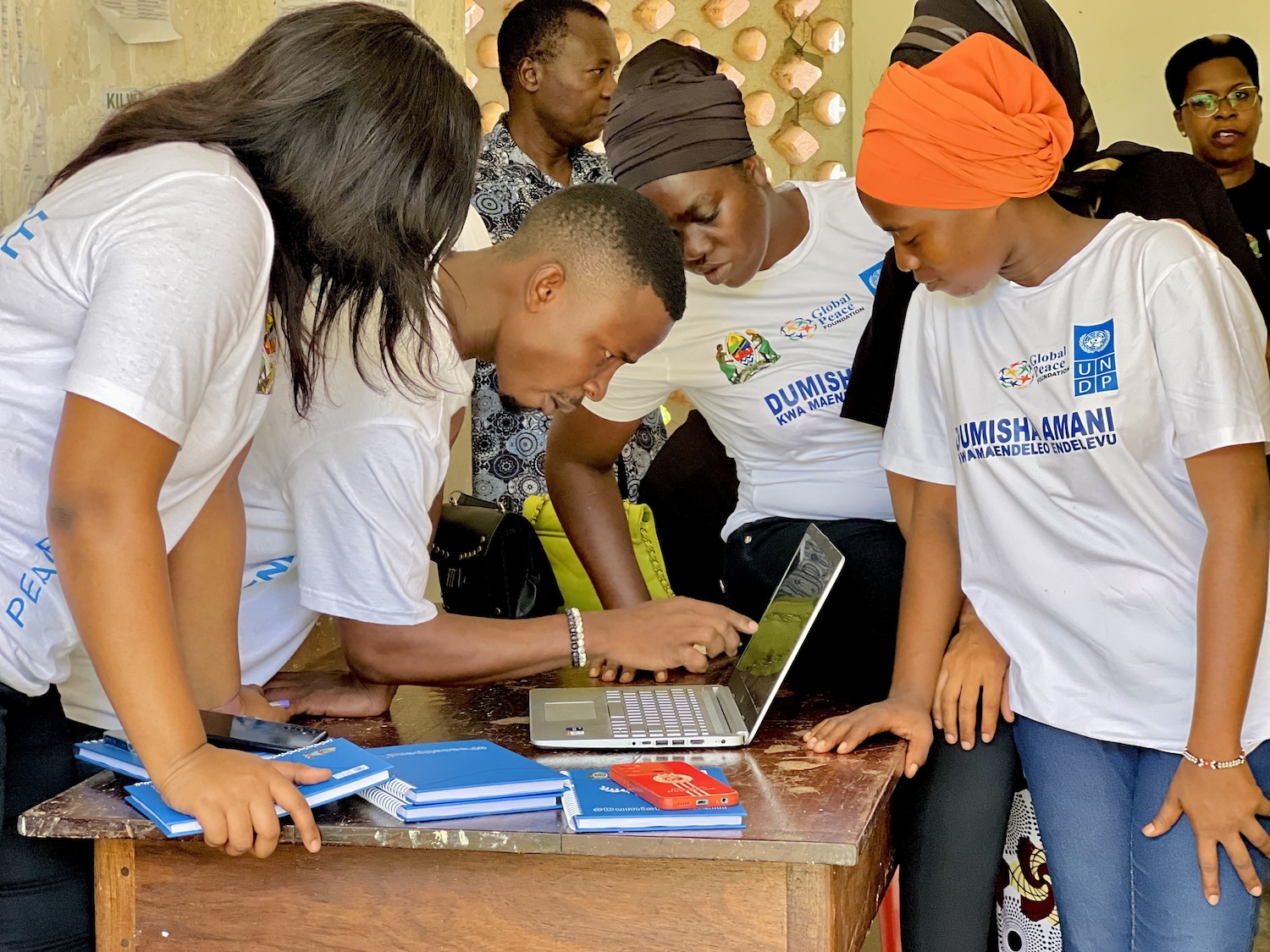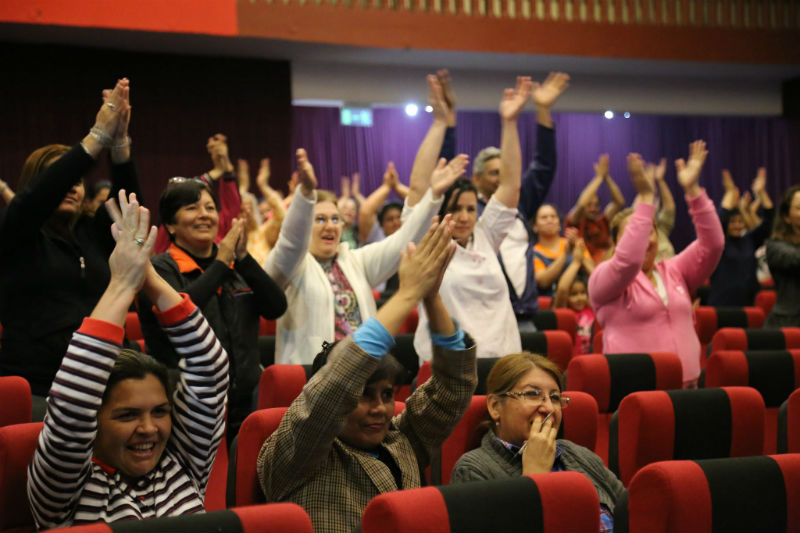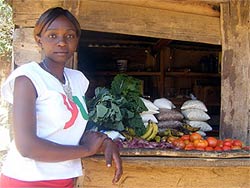
A microfinance recipient in Kenya. Micro-finance loans provide a path out of poverty and an incentive for communities divided by ethnicity to work collaboratively.
Microfinancing is a tool not only to fight poverty but also to bring peace among peoples who have been living under conflict and war for many years,entrepreneurs and lenders from Uganda, Burundi, Democratic Republic of Congo (DRC), and Kenya said at a forum entitled “Microfinance and Sustainable Development”, sponsored by the Global Peace Foundation. The forum was held on November 18, 2010 as part of the Global Peace Convention 2010 held in Nairobi, Kenya. The Global Peace Convention is the annual convening of global leaders hosted by the Global Peace Foundation, founded in 2009 by Dr. Hyun Jin Moon.
The simple practice of exchanging of goods and services creates a climate for social cohesion and peaceful community relations, panelists said. Participants in microfinance enterprises naturally develop a stake and interest in the social wellbeing among people across religious or tribal divisions. In an organized system of microfinanced ventures, the community is networked by mutual interests, with members often providing collateral for one another to access microfinance loans.
Poverty as a threat to peace
The forum explored how poverty, particularly among youth, often leads to a breakdown of established ethical and moral standards. High rates of unemployment and lack of other income may lead to “trial and error” actions without regard to questions of right or wrong. In Africa, youth have many times been recruited by rebel armed militias, which is seen as a way to recover dignity and respect. An environment of war and social dislocation often results in prostitution among girls and women, which in turn spreads HIV AIDS and other related diseases. The use of illicit drugs also flourishes in such environments, leading to further social upheaval.
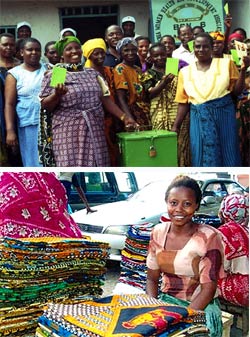
Women are frequent beneficiaries of microfinancing. Traditionally excluded from access to financial services, women have proven to be an excellent credit risk to lenders.
Microfinancing offers an effective response to this problem, forum speakers said. Though microloans are designed to be repaid within a short period, new jobs and opportunities are created, while borrowers have an obligation to work hard and rapidly make a profit to repay back their loans to the institution.
Most clients of microfinancing are highly motivated, very active and often busy with their small businesses. The more their businesses progress, the more credit worthy they become and the more loans can access. With growth, microfinanced businesses recruit others as employees, while other jobs are created to provide indirect support in goods and services.
Before a loan is disbursed to a borrower, Microfinance Institutions (MFIs) make sure the client’s activity is economically viable and potentially profitable. Successful MFIs take time to advice and coach clients in case his or her current business is not doing well. Most of the time loans are repaid within a short period of 3 to 10 months, and after that clients are educated and trained on how to manage their assets in order to access larger loans.
Some MFIs have ventured beyond savings and loans and organized additional financial services to their clients, such as micro health insurance, housing assistance and school loans. Some examples of these activities were presented during the forum.
Microfinance and social cohesion
Ethnic conflict is a serious challenge to peace and development in Africa. While appeals to patriotism and national cohesion often fall far short in impacting attitudes, the microfinance system has demonstrated its potential as an answer to this challenge. Microfinance naturally contributes to sustainable peace because the network of clients and staff are engaged in an honest and profitable enterprise; the incentive for peace accordingly exceeds the incentive to create insecurity through illicit activities that often target innocent people.
Since community members who are clients of MFIs have a common interest in accessing and paying back small loans, even members from tribes that have been in conflict have an incentive to collaborate as each may provide collateral for the other in obtaining a loan. Through this process former enemies learn to recognize common interests and even create strong friendships.
“Panelists pledged to put their expertise to work with the goal of expanding GPF’s peace building efforts and vision of One Family under God in East Africa and beyond.”
Microfinance institutions in Rwanda and Burundi have played a major role in bringing Hutu and Tutsi together, to collaborate through microfinancing ventures. In the Democratic Republic of the Congo, many of the young people who have been demobilized from the army or former rebel groups are now business people or entrepreneurs with the benefit of loans they received from microfinance institutions in Goma, the capital city of North Kivu province. They are defending peace now with their hard work.
Advancing peace through microfinancing
Panelists highlighted a major challenge to microfinance growth in the East African Great Lakes Region (Kenya, Uganda, Tanzania, Rwanda, Burundi, and DRC): a lack of funding for sustainable growth and expansion. Most institutions, particularly in Democratic Republic of the Congo, have not had access to external capital; they have grown through recycling their initial investors’ and clients’ savings as loans. This seriously limits the number of people they can to serve, and thus the impact that they can have.
Convention participants who attended this forum consequently engaged in discussions and presented recommendations to advance the work for peace and development substantially through microfinance globally. Among the recommendations were to establish a Global Microfinance Fund to seed and finance microfinance institutions in poor communities around the world with an objective of promoting peace and development. The forum proposed the launch of a pilot program in the Great Lakes Region. MFI’s from this region who participated in the Convention proposed to volunteer to provide free training and if necessary a follow up for any other country in world willing to start microfinance activities.
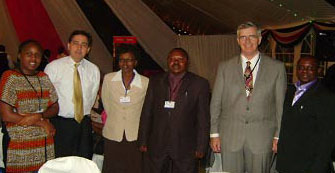
From left to right : Mrs Olive Mukankwaya, Mr John Dickson, Ms Benite Nyankima, Mr Ghislain K. Kapamba, Mr James Flynn, Mr Charles L. Rurahoze.
The forum emphasized that microfinance may provide an important opportunity to advance the the Global Peace Festival Foundation vision of One Family under God in practical and substantial way in every part of the world. Panelists specifically pledged to put their expertise to work with the goal of expanding GPF’s capacity for peace building in East Africa and beyond.
The panelists included the moderator, Mr Charles Rurahoze Lwanga, Managing Director of COOPEC AGRI (Microfinance Institution in DRC); Mr. Ghislain Kahindo Kapamba, Managing Director of CERP GALA LETU (a microfinance institution in DRC); Mrs. Olive Mukankwaya, Finance and Administrative Director of Vision Finance Company in Rwanda; Ms Bénite Nyankima, legal officer, Mutual Savings and credit cooperative from Burundi; and Mr Henry Mungai, Jamii Africa microfinance representative from Kenya.


